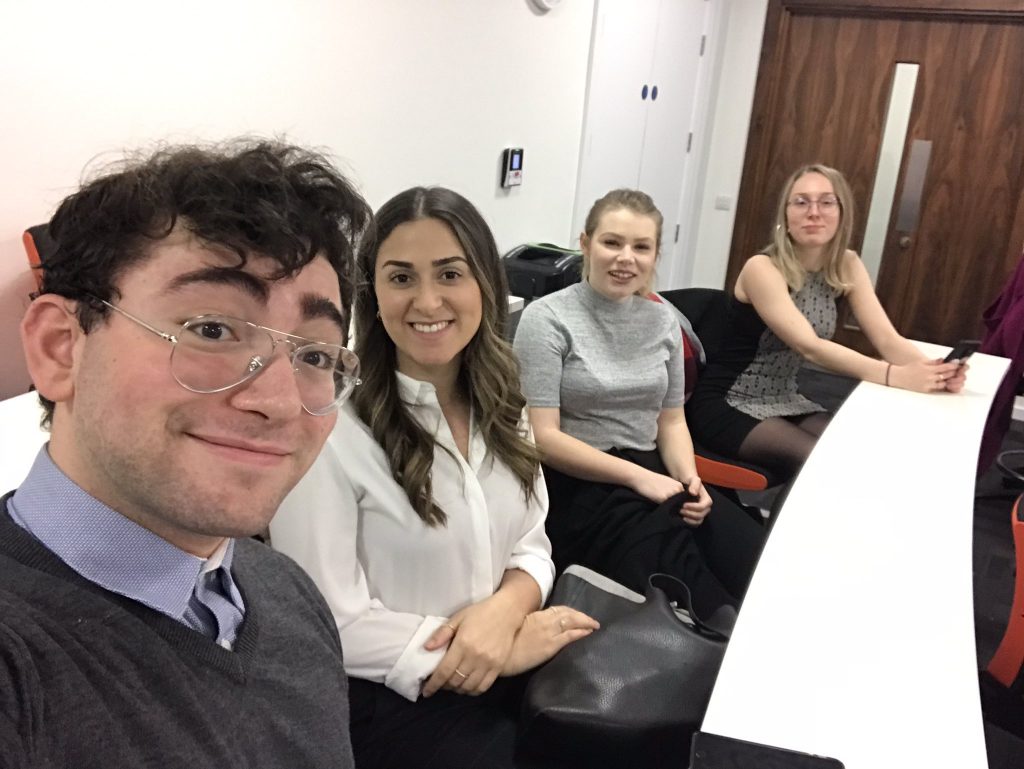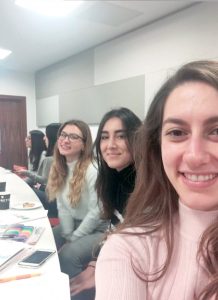Two teams of law students from Kent were among just eight teams selected to compete in the Legal Design Sprint 2020, a national competition run by the Bar Council in partnership with City Law School.
The teams from Kent Law School, each comprising four students, travelled to London on Monday (3 February) to tackle a series of four legal design challenges based on the themes: protecting freedom; fighting for rights; defending democracy; and saving the planet.
Competing in the Law School’s Team 1 were: Marie Ciulla; Helen Felemegos; Eleni-Ira Koutsoureli; and Aaryan Tokhi. And in Team 2, the students were: Catherine Brown; Sarah Ludgate; Simona Petti; and Daniel Rozenberg.
Legal Design is a way of re-imagining legal processes, with teams employing tools and techniques through different stages of the design process. Students were guided on Monday by expert practitioner Professor Emily Allbon from City Law School, a strong advocate for Legal Design and the creator of the websites tl;dr and Lawbore. Teams were taught ‘legal design thinking’ through lectures interwoven with interactive challenges before being tasked their assigned projects.
Team 1 representative, Helen, said: ‘Our team developed ideas on how to raise awareness of individuals with special needs within the judicial system. This has come to the attention of the Bar Council after a recent tweet from a barrister (on 25 January 2020!) revealed that a judge yelled at her client with Parkinson’s for shaking in court and almost held this client in contempt! We are all very passionate about this topic and quickly drafted a plan to put into place. Effectively, we hope to develop the ethics course put in place within the Bar’s training curriculum in order to implement a program which would held develop barristers’ awareness of the needs of disabled individuals while also respecting their voices.’
Daniel, in Team 2, said: ‘Our assigned challenge is working with the Public Law Project, a project that was founded to help the marginalised, destitute, and disadvantaged hold public authorities accountable. We are tasked with creating an accessible explainer for people who are going through the process of judicial review, often without legal support.’ So far, the team has identified three big challenges to the accessibility of judicial review:
- Unawareness: Most people have no idea that judicial review exists as a recourse to rectifying an injustice by a public body they may have suffere
- Mystification: Even once aware of judicial review, many would-be users of the complex process are intimidated by the daunting prospect of going through court and potentially losing
- Access to justice: For litigants in person already in a judicial review, the process is often still intangible and nebulous, and even after a judgment is given, the real-life effect may not be easy to grasp, so that a concrete sense of justice can be quite elusive through this legal tool
Daniel reflects further on his experience of competing, and of his experience of working with Legal Design, in a post on our blog.
Both teams have been given the rest of the month to perfect their designs. At the end of February, during Justice Week 2020 (on Friday 28 February), the teams will return to London to present their legal design solutions to a panel of judges at the Bar Council offices.
Law School Lecturer Darren Weir (who nominated the teams) said: ‘The teams from Kent are passionate about criminal justice and process and all have their own unique contributions that they will be able to bring to this project. Between them they are fluent in six languages and grasp the importance of effective communication. All have an interest in alternative communication techniques with a particular emphasis in making legal concepts easier to understand.’
Daniel (leading Team 2) has already gained valuable experience of working with legal design having assisted Kent Law School Professor Amanda Perry-Kessaris with research for her forthcoming book Doing Sociolegal Research in Design Mode (Routledge, 2020).


